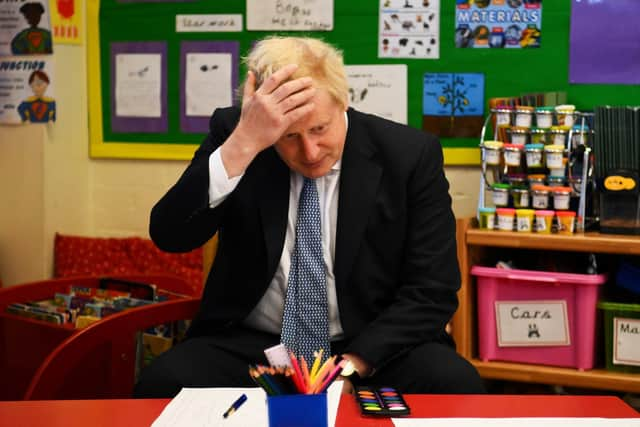Hapless Boris Johnson has no answer to cost of living crisis which takes us back to the 1970s - Andrew Vine
Any of us who remember the grim mid-70s really have no desire for a repeat of them. Food shot up in price on a weekly basis, we were plunged into darkness by power cuts and the queues outside Woolworths for candles, which were in short supply, added to the general sense that the country was in a mess.
Like many another working class Yorkshire families, money was tight for mine and I remember all too well how worried my parents were about the cost of living, to the extent that meat appeared less frequently on the dinner table than it had.
Advertisement
Hide AdAdvertisement
Hide AdThe signs of scrimping and saving were everywhere. Everybody at my school wore hand-me-down uniforms, and the families which had cars kept rusting, clanking old bangers going long after they should have been scrapped because buying a replacement was out of the question. These were the realities of life for countless families 50 years ago, and the prospect of


Cabinet Ministers blithely predicting the same again in the 21st century makes my blood boil.
Yet it’s already happening, and things are arguably worse in some respects.
When I was growing up in the 70s, nobody needed to rely on food banks in order to eat. They do now, including people working full time for pitifully low wages, or those on zero-hour contracts. Yesterday, a study by the Food Foundation think tank found more than two million adults cannot afford to eat every day, that number up by 50 per cent since January.
Nor did we then have to choose between heating and eating.
Advertisement
Hide AdAdvertisement
Hide AdNow we have Elsie, a woman of 77, on television telling a Prime Minister squirming with awkwardness that she has resorted to spending all day on buses in order to keep warm because of soaring energy bills.
Meanwhile, Shell makes its biggest quarterly profit on record, £7.2bn, on oil and the gas that Elsie cannot afford to stay warm at home.
What a shameful state of affairs, and what an indictment of Government policy, or to be more accurate, the lack of it. There must be a lot of Elsies out there, and it’s an unsettling thought that in 1974, when only in their 20s and with everything to look forward to, they could never have imagined that a lifetime of work would buy them an old age of penury.
Forecasts of inflation hitting 10 per cent and a possible recession next year will hit Elsie’s generation especially hard, diminishing what their pensions are worth and turning the arrival of every gas and electricity bill into a moment of dread.
Advertisement
Hide AdAdvertisement
Hide AdBut it is not only the elderly who are suffering. In the months ahead, there are going to be conversations in countless homes that mirror those of my parents half a century ago about what can be gone without in order to make ends meet.
The highest levels of tax since shortly after the Second World War, increased mortgage costs as interest rates rise, and yet another hike in energy prices as we head into winter amount to a manifesto for desperation and deprivation.
Even the head of one of the country’s largest energy supplier, Scottish Power, warned yesterday that there will have to be additional help for families. And the Government’s answer? The hapless expression on Boris Johnson’s face when confronted by Elsie’s plight spoke volumes. He hadn’t a clue how to respond, and that looked to me like an entirely accurate reflection of his policy for dealing with this growing cost of living crisis.
This simply isn’t good enough. Nor is it good enough for the Chancellor to make sympathetic noises but then say many of the factors driving rising costs are beyond his control, or for Ministers to suggest shoppers buy supermarket own-brand products to shave a few pennies from food bills.
Advertisement
Hide AdAdvertisement
Hide AdThere is an absence of action – and of compassion for the poorest – from the Government when it is clear that steps could be taken now to ease pressure on households.
A windfall tax on the obscenely high profits of energy companies to fund rebates on gas and electricity bills is one of them. Suspending green levies that inflate those bills is another.
Backtracking on the National Insurance rise introduced last month is a third.
Ministers should not be shrugging their shoulders and leaving families to struggle as mine had to during the 1970s.
Advertisement
Hide AdAdvertisement
Hide AdAnd if the Government lacks sufficient sense of decency to do something about this, then Ministers making comparisons with 50 years ago ought to reflect on the sequel to so many people struggling then that might concentrate their minds.
The country decided that a clueless generation of politicians with no answers to offer had been in power for too long and kicked them out.